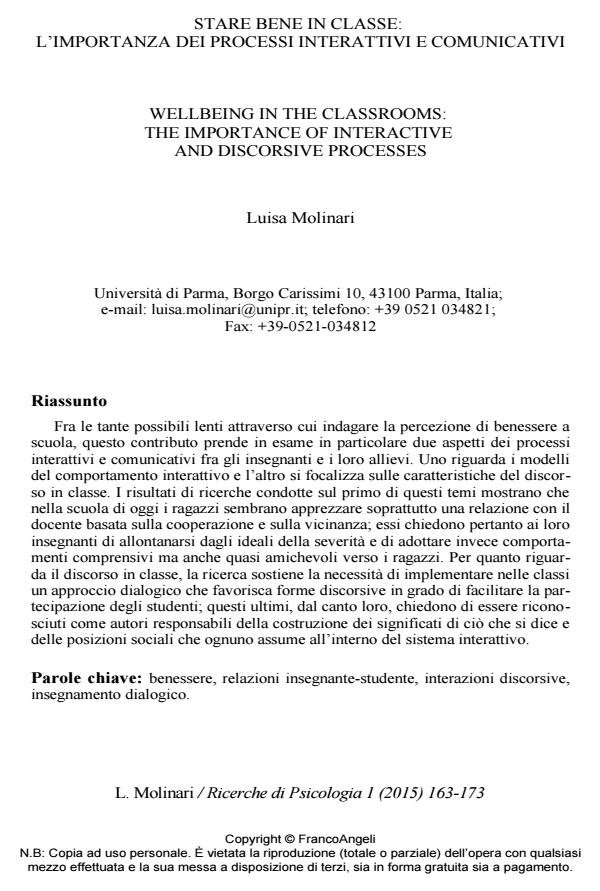Wellbeing in the classrooms: the importance of interactive and discorsive processes
Journal title RICERCHE DI PSICOLOGIA
Author/s Luisa Molinari
Publishing Year 2015 Issue 2015/1 Language Italian
Pages 11 P. 163-173 File size 176 KB
DOI 10.3280/RIP2015-001010
DOI is like a bar code for intellectual property: to have more infomation
click here
Below, you can see the article first page
If you want to buy this article in PDF format, you can do it, following the instructions to buy download credits

FrancoAngeli is member of Publishers International Linking Association, Inc (PILA), a not-for-profit association which run the CrossRef service enabling links to and from online scholarly content.
This paper explores the topic of students’ wellbeing in the classrooms by focussing on two aspects related to the interactive and discursive processes. The first concerns the models of teacher-student interactions and the second refers to classroom discourse. In school, students reveal to appreciate a teacher-student relationship characterized by cooperation and proximity. They tend to ask their teachers to dismiss the traditional role of a severe and authoritative teacher and to adopt behaviours based on comprehension and friendliness towards their students. With regard to classroom discourse, we argue about the importance to adopt a dialogic teaching, able to enhance discursive interactions that favour students’ participation and active engagement in their reasoning and argumentation.
Keywords: Wellbeing, teacher-student relationships, discursive interactions, dialogic teaching.
- Alexander, R.J. (2006). Towards dialogic teaching: rethinking classroom talk. New York: Dialogos.
- Brok, P. den, Brekelmans, M., & Wubbels, Th. (2006). Multilevel issues in research using students’ perceptions of learning environments: The case of the Questionnaire on Teacher Interaction. Learning Environments Research, 9, 199-213. DOI 10.1007/s10984-006-9013-9.
- Candela, A. (2005). Students’ participation as co-authoring of school institutional practices. Culture & Psychology, 11(3), 321-337. DOI: 10.1177/1354067
- X05055523.
- Eccles, J.S., & Roeser, R.W. (2011). Schools as developmental contexts during
- adolescence. Journal of Research on Adolescence, 21(1), 225-241.
- DOI: 10.1111/j.1532-7795.2010.00725.x
- Goh, S.C, & Fraser, B.J. (1998). Teacher interpersonal behaviour, classroom environment
- and student outcomes in primary mathematics in Singapore. Learning
- Environments Research, 1, 199-229.
- Harre, R. (1986). The social construction of emotions. Oxford: Blackwell (tr. it.,
- La costruzione sociale delle emozioni, Milano, Giuffre, 1992). Koul, R., & Fisher, D. (2005). Cultural background and students’ perceptions of science classroom learning environment and teacher interpersonal behavior in Jammu, India. Learning Environments Research: An International Journal, 8, 195-211. DOI: 10.1007/s10984-005-7252-9
- Lefstein, A. (2010). More helpful as a problem then solution: some implications of situating dialogue in classrooms. In K. Littleton & C. Howe (Eds.), Educational dialogue (pp. 170-191). London: Routledge.
- Lefstein, A., & Snell, J. (2013). Better than best practices: developing dialogic pedagogy. London: Routledge.
- Lyle, S. (2008). Dialogic teaching: discussing theoretical contexts and reviewing evidence from classroom practice. Language and Education: An International Journal, 22(3), 222-240. DOI: 10.1080/09500780802152499
- Maulana, R., Opdenakker, M.-C., den Brok, P., & Bosker, R. (2011). Teacher-student interpersonal relationships in Indonesia: profiles and importance to student motivation. Asia Pacific Journal of Education, 31(1), 33-49. DOI: 10.1080/02188791.2011.544061
- Michaels, S., O’Connor, C., & Resnick, L. (2008). Deliberative discourse idealized and realized: accountable talk in the classroom and in civic life. Studies in Philosophy and Education, 27(4), 283-297.
- Molinari, L., & Bertocchi, S. (2007). La responsabilita a scuola e in famiglia. Una ricerca su insegnanti e genitori. Giornale Italiano di Psicologia, 4, 901-920.
- Molinari, L., Bertocchi, S., & Speltini, G. (2008). Adolescenti e responsabilita tra pari. Psicologia dell’Educazione, 2(1), 55-76.
- Molinari, L., & Mameli, C. (2013). Process quality of classroom discourse: Pupil participation and learning opportunities. International Journal of Educational Research, 62, 249-258. DOI: 10.1016/j.ijer.2013.05.00
- Molinari, L., & Speltini, G. (2007). Representations sociales de la responsabilite educative. Bulletin de Psychologie, 60(2), 99-113.
- O’Connor, C., & Michaels, S. (2007). When dialogue is ‘dialogic’. Human Development, 50, 275-285. DOI: 10.1159/000106415
- Rojas-Drummond, S., Mazon, N., Fernandez, M., & Wegerif, R. (2006). Explicit reasoning, creativity and co-construction in primary school children’s collaborative activities. Thinking Skills and Creativity, 1, 84-94. DOI: 10.1016/j.tsc.2006.06.001
- Scott, P.H., Mortimer, E.F., & Aguiar, O.F. (2006). The tension between authoritative and dialogic discourse: A fundamental characteristic of meaning making interactions in high school science lessons. Science Education, 90, 605-631. DOI: 10.1002/sce.20131
- Skidmore, D. (2000). From pedagogical dialogue to dialogical pedagogy. Language and Education, 14(4), 283-296.
- Speltini, G., & Molinari, L. (2012). A scuola di giustizia e di democrazia. In G. Petrillo (Ed.), Senso di giustizia e benessere in adolescenza. Roma: Carocci.
- Wells, G. (1999). Dialogic Inquiry: Towards a Sociocultural Practice and Theory of Education. Cambridge: Cambridge University Press. Wertsch, J. (2008). From social interaction to higher psychological processes. Human Development, 51, 66-79. DOI: 10.1159/000112532
- Wubbels, Th., & Levy, J. (1993). Do you know what you look like? London: Falmer Press.
- Wubbels, Th., Brekelmans, M., den Brok, P., & Tartwijk, J. van (2006). An interpersonal perspective on classroom management in secondary classrooms in the Netherlands. In. C. Evertson & C.S. Weinstein (Eds.), Handbook of classroom management: research, practice and contemporary issues (pp.1161-1191). New York: Lawrence Erlbaum Associates.
- Zamperini, A. (1998). Psicologia sociale della responsabilita. Torino: Utet.
- Stili educativi genitoriali, benessere scolastico e rendimento scolastico in adolescenza Maria Giulia Olivari, Eleonora Mascheroni, Gaia Cuccì, Emanuela Confalonieri, in RICERCHE DI PSICOLOGIA 1/2019 pp.9
DOI: 10.3280/RIP2019-001001
Luisa Molinari, Stare bene in classe: l’importanza dei processi interattivi e comunicativi in "RICERCHE DI PSICOLOGIA " 1/2015, pp 163-173, DOI: 10.3280/RIP2015-001010